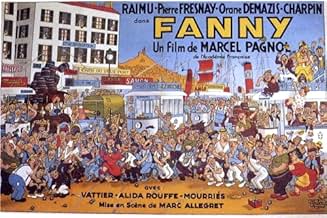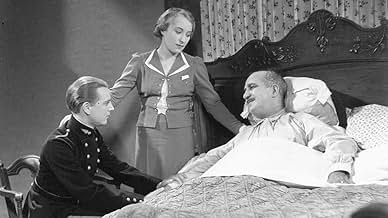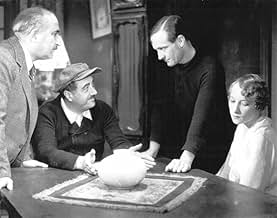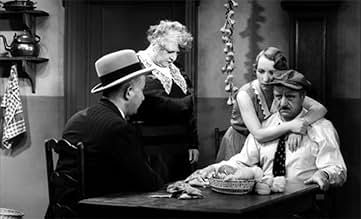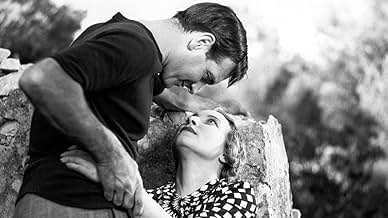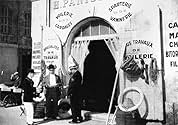IMDb RATING
7.8/10
2.1K
YOUR RATING
After Fanny's boyfriend leaves her and sails away, she finds out she's pregnant.After Fanny's boyfriend leaves her and sails away, she finds out she's pregnant.After Fanny's boyfriend leaves her and sails away, she finds out she's pregnant.
Fernand Charpin
- Honore Panisse
- (as Charpin)
Auguste Mouriès
- Félix Escartefigue
- (as Mouriès)
Robert Vattier
- Albert Brun
- (as Vattier)
Édouard Delmont
- Dr. Felicien Venelle
- (uncredited)
Pierre Prévert
- Un voyageur du tramway
- (uncredited)
Annie Toinon
- Amélie
- (uncredited)
Featured reviews
Part the Second of this trilogy reminds us that at heart it is pure melodrama and if not quite 'dead! and never called me mother', it is certainly from the same stable. Arguably Orane Demazis - replicating here, as indeed are all the principals, her stage role as the eponymous seduced and abandoned and slightly enceinte ingenue - is the weakest link in an unusually strong chain yet even then with the handicap of being saddled with a role that today would be risible (I doubt if it is possible to 'SPOIL' a classic which is now some 72 years old so suffice it to say that as a result of 'giving herself' to Marius, shortly before he ships out on an extended cruise, Fanny finds herself in an 'interesting' position and must make some tough choices. Today, of course, it is practically an honor to fall pregnant with no father material in sight and a State standing by to cosset the resulting infant from cradle to grave but in 1932 the resulting 'shame' embraced not only the mother-to-be but also her family) she manages to elicit our compassion and keep our humor at bay. Pedants will have a field day with the dodgy arithmetic - Marius has supposedly signed up for a five-year voyage yet on his return Fanny's son is a mere 10 months old - but what matters is the acting-plus-believability factor and here, thanks as always to the great Raimu, aided and abetted by Fernand Charpin, Alida Rouffe and Milly Mathis they bring it off to a fare-thee-well. Pierre Fresnay as Marius does little more than play the fly-in-the-ointment in the closing quarter of the movie and may well have been looking ahead one full decade to 'Le Corbeau'. Building on the first part and moving seamlessly to the next stage this is a worthy successor to 'Marius'. 9/10
Fanny (1932) :
Brief Review -
The best possible follow-up to Cult Classic 'Marius' and a highly sensitive content far ahead of its time. So this was exactly 37 years before Bollywood adopted this concept with "Ek Phool Do Mali" in 1969, which was considered ahead of its time due to the sensitivity of the topic then just imagine how far ahead Fanny was for its time? Truly unthinkable. And the maturity of this concept was beyond acceptance for 30s audience. French Cinema created a Classic Tear-jerker like 'Marius' (1931) but the way that film ends certainly gives a chance to a great follow-up which could have easily been predicted while watching Marius only. Fanny begins right where Marius ended as we see Fanny getting pregnant by Marius child after Marius had left to acquire his wild dreams. Panisse asks her to Marry him and promises to love the child like his own but things get messy as all of sudden Marius returns to visit the town for a short time of period. Okay, this was highly predictable and even the next things coming were pretty easy to predict or rather i would say things go exactly as you would have liked it to predict and therefore Fanny ends on an matured and fulfilling note. The problem here is, Fanny follows a Cult film which puts a lot of burden on it so obviously it stays behind its predecessor. The emotional quotient is not high when there was a potential for it and most importantly it doesn't make the characters look intellectual which it should have done considering their intellectual behaviour in the predecessor. However, for any Normal film it is overwhelming for sure. I dare everyone, beat the time limit of this content if you can. It was at least 2-3 decades ahead of its time for the impact in real life. Overall, its a deserving sequel which deserves individual love instead of underwhelming praise caused by comparison with its prequel.
RATING - 7.5/10*
By - #samthebestest
The best possible follow-up to Cult Classic 'Marius' and a highly sensitive content far ahead of its time. So this was exactly 37 years before Bollywood adopted this concept with "Ek Phool Do Mali" in 1969, which was considered ahead of its time due to the sensitivity of the topic then just imagine how far ahead Fanny was for its time? Truly unthinkable. And the maturity of this concept was beyond acceptance for 30s audience. French Cinema created a Classic Tear-jerker like 'Marius' (1931) but the way that film ends certainly gives a chance to a great follow-up which could have easily been predicted while watching Marius only. Fanny begins right where Marius ended as we see Fanny getting pregnant by Marius child after Marius had left to acquire his wild dreams. Panisse asks her to Marry him and promises to love the child like his own but things get messy as all of sudden Marius returns to visit the town for a short time of period. Okay, this was highly predictable and even the next things coming were pretty easy to predict or rather i would say things go exactly as you would have liked it to predict and therefore Fanny ends on an matured and fulfilling note. The problem here is, Fanny follows a Cult film which puts a lot of burden on it so obviously it stays behind its predecessor. The emotional quotient is not high when there was a potential for it and most importantly it doesn't make the characters look intellectual which it should have done considering their intellectual behaviour in the predecessor. However, for any Normal film it is overwhelming for sure. I dare everyone, beat the time limit of this content if you can. It was at least 2-3 decades ahead of its time for the impact in real life. Overall, its a deserving sequel which deserves individual love instead of underwhelming praise caused by comparison with its prequel.
RATING - 7.5/10*
By - #samthebestest
If you can get by the first fifteen minutes, get into the leisurely pacing and that fact that nothing is going to explode and no one shoots anybody or stabs anyone in the eye, and the film is about learning to live with other human beings, about being a parent, about falling and staying in love, perhaps you'll come to love this film, too.
The trilogy is set in another time long gone--Marseilles, a provincial fishing village, where Cesar and his son operate a sort of bar where locals drift in and out and play cards; a pretty young woman sells seafood outside, and she's known son Marius since they were children. Enough said: except that the acting is amazingly naturalistic for a 1930's film, that the performance by famed French entertainer Raimu is beyond words, is simply astounding in his range of emotions, his understanding of the human condition. This understated drama is a quiet masterpiece.
The trilogy is set in another time long gone--Marseilles, a provincial fishing village, where Cesar and his son operate a sort of bar where locals drift in and out and play cards; a pretty young woman sells seafood outside, and she's known son Marius since they were children. Enough said: except that the acting is amazingly naturalistic for a 1930's film, that the performance by famed French entertainer Raimu is beyond words, is simply astounding in his range of emotions, his understanding of the human condition. This understated drama is a quiet masterpiece.
French playwright Marcel Pagnol, hooked on cinema since 1929, knew a sequel to one of his most famous plays which was turned into a movie would be a winner. When Paramount Pictures refused to produce a follow-up to 'Marius,' Pagnol formed his own film production company, and with the assistance of director Marc Allegret, released October 1932 "Fanny" to great acclaim.
Pagnol had seen his 1929 play 'Marius,' adapted into a 1931 film of the same name, directed by Alexander Korda. The story centered around a son of a Marseilles, France, bar-owner, Marius, who yearns to see the world by getting a job for a long sea voyage even though he had a serious relationship with his girlfriend Fanny. "Marius" was a success for Paramount. After the studio turned down Pagnol's offer for a sequel, the playwright proceeded to write a script penned as "Fanny" and make a movie from it. The difference in quality between the two films reflects the evolution of film technology that progressed quickly during that short period. Whereas the original was a stage-bound affair with most of its scenes constricted inside the tavern, 1932's "Fanny's" camera is more mobile, capturing exterior footage of Marseilles and tracking Fanny (Orane Demazis) throughout the city. Director Allegret hid his camera inside a van to capture the city's residents going about their business unaware they were on film. Because of such shots, producer Pagnol has been called a pioneer in cinema Neorealism, mixing both the dramatic plot of the movie with real-life scenes.
In "Fanny," the last night the two lovers spend together before Marius sets out on his five-year voyage results in a pregnancy. Upon discovering the budding life in her womb, Fanny turns to Honore Panisse (Charpin), a prosperous sea merchant who's 30 years older. In 'Marius,' he had proposed to Fanny, only to be rejected. In the sequel, Fanny is resigned to accept his proposal to marry for the sake of her newborn. Then, after two years at sea, Marius, on shore leave, surprises Fanny. That's when Pagnol makes things very interesting for all those involved. Film critic Jamie Rich said "the acting is so good, you might find yourself wishing this were an ongoing series."
Riding on the success of "Fanny," Pagnol wrote a sequel to the sequel. He gave up composing stage plays to make feature films, and he directed the third of his so-called 'Marseilles Trilogy,' 1936's 'Cesar.' The movie picks up the story of Fanny where her son, Cesariot, is a young man and is told about who his real father is after his adopted father Panisse died.
"Fanny's" international popularity gave French cinema a boast in both quality and popularity. Pagnol's trilogy has been made into several motion pictures, the first a James Whale directed and Preston Sturges scripted, 1938s "Port of Seven Seas." The three stories were combined into a 1954 Broadway musical, running an astounding 888 performances. The 1961 Technicolor film, "Fanny," with Leslie Caron, Maurice Chevalier and Charles Boyer, blends all three scripts of Pagnol's into one full-length film. And the Daniel Auteuil directed, written and acted 2013 "Fanny" was based on the 1932 version.
Pagnol had seen his 1929 play 'Marius,' adapted into a 1931 film of the same name, directed by Alexander Korda. The story centered around a son of a Marseilles, France, bar-owner, Marius, who yearns to see the world by getting a job for a long sea voyage even though he had a serious relationship with his girlfriend Fanny. "Marius" was a success for Paramount. After the studio turned down Pagnol's offer for a sequel, the playwright proceeded to write a script penned as "Fanny" and make a movie from it. The difference in quality between the two films reflects the evolution of film technology that progressed quickly during that short period. Whereas the original was a stage-bound affair with most of its scenes constricted inside the tavern, 1932's "Fanny's" camera is more mobile, capturing exterior footage of Marseilles and tracking Fanny (Orane Demazis) throughout the city. Director Allegret hid his camera inside a van to capture the city's residents going about their business unaware they were on film. Because of such shots, producer Pagnol has been called a pioneer in cinema Neorealism, mixing both the dramatic plot of the movie with real-life scenes.
In "Fanny," the last night the two lovers spend together before Marius sets out on his five-year voyage results in a pregnancy. Upon discovering the budding life in her womb, Fanny turns to Honore Panisse (Charpin), a prosperous sea merchant who's 30 years older. In 'Marius,' he had proposed to Fanny, only to be rejected. In the sequel, Fanny is resigned to accept his proposal to marry for the sake of her newborn. Then, after two years at sea, Marius, on shore leave, surprises Fanny. That's when Pagnol makes things very interesting for all those involved. Film critic Jamie Rich said "the acting is so good, you might find yourself wishing this were an ongoing series."
Riding on the success of "Fanny," Pagnol wrote a sequel to the sequel. He gave up composing stage plays to make feature films, and he directed the third of his so-called 'Marseilles Trilogy,' 1936's 'Cesar.' The movie picks up the story of Fanny where her son, Cesariot, is a young man and is told about who his real father is after his adopted father Panisse died.
"Fanny's" international popularity gave French cinema a boast in both quality and popularity. Pagnol's trilogy has been made into several motion pictures, the first a James Whale directed and Preston Sturges scripted, 1938s "Port of Seven Seas." The three stories were combined into a 1954 Broadway musical, running an astounding 888 performances. The 1961 Technicolor film, "Fanny," with Leslie Caron, Maurice Chevalier and Charles Boyer, blends all three scripts of Pagnol's into one full-length film. And the Daniel Auteuil directed, written and acted 2013 "Fanny" was based on the 1932 version.
10rsoonsa
FANNY is the second film of a trilogy, based upon a play by Marcel Pagnol, from which all three works are taken, featuring most of the cast of excellent actors which made the stage original a great artistic and popular success, including Raimu, Charpin, Pierre Fresnay, and Orane Demazis as Fanny, an assemblage which remains faithful to the heart of the original. By repudiating the normal placement of concurrent French films made in Parisian studios, and producing the work in his native Marseilles, in Provence, Pagnol achieves a finely-hewn naturalism which is very congenial to the scenario, dealing as it does with a hard-working bourgeoisie whose lives are in concert with rhythms of a major seaport. Fanny's passionate attention to Marius (Fresnay) results in her pregnancy from their farewell coupling at the denouement of the first of the trilogy, MARIUS, with her lover falling prey to the lure of a seafaring life and she, abandoned, accepts a proposal of marriage from a much older M. Panisse (Charpin), in order to save the reputation of her family. The love of Panisse for the child of Fanny is the moving force in what must be the inevitable fulfillment of the storyline, i.e., the return of Marius to claim his erstwhile fiancée and his true child in a scene which brings the best from Demazis, Fresnay, and Raimu as Cesar, the father of Marius and lifelong friend of Panisse. Pagnol directed only the finale of the trio, and selects for FANNY Marc Allegret, who leads the cast with distinction, displaying particular skill when allowing Pagnol's magnificent dialogue to be developed in what is essentially a filmed work for the stage, with few sets, and who allows liberal emphasis upon the plastic Raimu, who is, after all, the most important presence in this romantic masterpiece.
Did you know
- TriviaFamed restaurateur and founder of California cuisine, Alice Waters, was so taken with the Fanny trilogy that she named her Berkeley restaurant Chez Panisse. The café upstairs from the restaurant is decorated with posters from the films Marius, Fanny, and César. Waters also named her own daughter Fanny and opened a small breakfast café in Berkeley called "Café Fanny" in 1984 which closed in March 2012.
- ConnectionsEdited into Histoire(s) du cinéma: Une histoire seule (1989)
- How long is Fanny?Powered by Alexa
Details
Box office
- Gross US & Canada
- $8,262
- Opening weekend US & Canada
- $7,720
- Jan 8, 2017
- Gross worldwide
- $8,262
- Runtime2 hours 20 minutes
- Color
- Aspect ratio
- 1.20 : 1
Contribute to this page
Suggest an edit or add missing content


